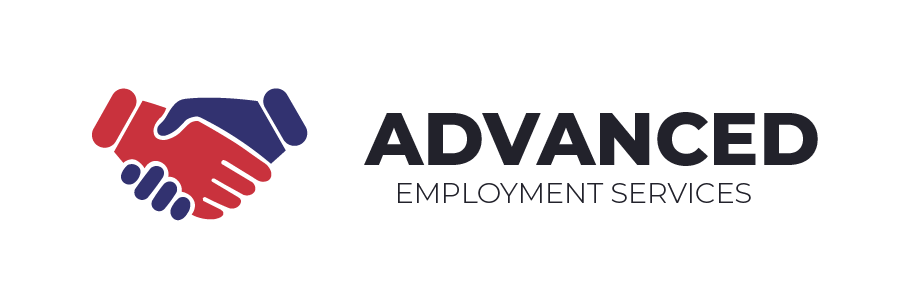Table of Contents
Hiring the right employee is one of the most critical decisions a company can make. The success of your business relies heavily on the people you bring on board, making it essential to approach the hiring process with a clear strategy and a keen eye for detail. From identifying the qualities that align with your company culture to navigating the interview process, there’s much to consider. In this article, we’ll explore what employers should look for when hiring for an open position and what to expect throughout the process. Additionally, we’ll highlight how Advanced Employment Services can streamline this process by handling the interviewing on your behalf.
The Importance of a Well-Structured Hiring Process
A well-structured hiring process is the foundation of successful recruitment. It not only helps you find the best candidate for the job but also ensures that the hiring process is efficient, fair, and compliant with legal requirements. Here’s why a structured hiring process is crucial:
Consistency and Fairness
A consistent process ensures that every candidate is evaluated based on the same criteria, reducing the risk of bias. This fairness is critical in maintaining a positive company reputation and adhering to legal standards.
Example: Implementing standardized interview questions for all candidates helps ensure that everyone is judged equally, which promotes fairness in the selection process.
Better Candidate Experience
A smooth and professional hiring process creates a positive experience for candidates. Even if a candidate is not selected, a good experience can lead to positive word-of-mouth and may encourage them to apply for future openings.
Example: Providing timely updates and feedback to candidates shows respect for their time and effort, which can enhance your company’s reputation.
Effective Use of Resources
A structured process helps you use your resources efficiently, ensuring that you’re focusing your efforts on the most promising candidates and minimizing time spent on unqualified applicants.
Example: Pre-screening resumes based on specific criteria before conducting interviews can save time and resources by narrowing down the candidate pool.

What to Look for When Hiring
Knowing what to look for in a candidate is essential to making the right hiring decision. While the specific qualifications and skills will vary depending on the position, there are several key attributes that all employers should consider:
Relevant Experience and Skills
The most obvious requirement is ensuring the candidate has the necessary experience and skills to perform the job effectively. However, it’s important to look beyond the resume and consider how their previous experience aligns with the role’s specific demands.
Example: If you’re hiring for a sales position, look for candidates with a proven track record in sales, but also consider their experience in similar industries or roles that required similar skills.
Cultural Fit
A candidate’s ability to fit within your company culture is just as important as their technical skills. Hiring someone who aligns with your company’s values, work ethic, and team dynamics can lead to greater job satisfaction and long-term success.
Example: If your company values collaboration and teamwork, look for candidates who demonstrate strong interpersonal skills and a history of working well in team environments.
Adaptability and Growth Potential
In today’s fast-paced work environment, adaptability is a crucial trait. Candidates who show a willingness to learn and grow with the company can be valuable assets, especially in roles that may evolve over time.
Example: Ask candidates about a time when they had to learn a new skill or adapt to a significant change at work. Their response can provide insight into their adaptability and growth potential.
Problem-Solving Skills
Problem-solving is a vital skill in nearly every role. Look for candidates who can demonstrate their ability to think critically, analyze situations, and develop effective solutions.
Example: During the interview, present a hypothetical problem related to the job and ask the candidate how they would approach solving it. This can give you a sense of their problem-solving abilities and creativity.
Communication Skills
Strong communication skills are essential in any role. Whether it’s written or verbal, the ability to convey ideas clearly and listen effectively is crucial for success in the workplace.
Example: Evaluate a candidate’s communication skills during the interview process by observing how they articulate their thoughts and respond to questions.
Work Ethic and Integrity
A strong work ethic and integrity are non-negotiable traits. Candidates who demonstrate a commitment to doing their best work and acting with integrity are more likely to contribute positively to your organization.
Example: Ask candidates to describe a time when they faced an ethical dilemma at work and how they handled it. Their response can provide insight into their values and work ethic.
Passion and Enthusiasm
Passion and enthusiasm can be powerful motivators. Candidates who are genuinely excited about the role and the company are more likely to be engaged and committed employees.
Example: During the interview, pay attention to how the candidate talks about the role and the industry. Are they enthusiastic and knowledgeable, or do they seem indifferent?

The Hiring Process: What to Expect
Hiring an employee involves several stages, each of which plays a critical role in finding the right fit for your organization. Here’s an overview of the typical hiring process:
Job Posting and Recruitment
The first step is to create a detailed job posting that clearly outlines the responsibilities, qualifications, and expectations for the role. This posting should be shared on job boards, social media, and your company’s website.
Example: A well-crafted job posting for an IT manager might include specific technical skills required, years of experience, and a description of the company’s work culture.
Application Screening
Once applications start coming in, the next step is to screen resumes to identify candidates who meet the basic qualifications. This is where you’ll narrow down the pool to those who are most likely to succeed in the role.
Example: Using applicant tracking software (ATS) can help streamline the screening process by automatically filtering resumes based on keywords and criteria.
Conducting Interviews
Interviews are a crucial part of the hiring process, allowing you to assess a candidate’s qualifications, personality, and fit with the company. There are several types of interviews you might conduct:
- Phone/Video Interviews: These initial interviews are often used to further screen candidates before inviting them for in-person interviews.
- In-Person Interviews: These interviews allow for a deeper assessment of the candidate’s skills and cultural fit. This is also an opportunity to meet with multiple team members or managers.
- Panel Interviews: In some cases, a panel interview may be conducted where multiple interviewers ask questions and evaluate the candidate together. Example: A company hiring for a senior role might conduct multiple rounds of interviews, starting with a phone screen and moving on to panel interviews with key stakeholders.
Reference Checks
Before making a final decision, it’s important to conduct reference checks to verify the candidate’s work history and performance. This step helps ensure that the candidate has been truthful and that their past experience aligns with their resume and interview responses.
Example: When checking references, ask about the candidate’s strengths, weaknesses, and how they performed in their previous roles. This can provide valuable insights that might not have been apparent during the interview process.
Making an Offer
Once you’ve identified the best candidate, the next step is to make a job offer. This typically involves drafting an offer letter that outlines the salary, benefits, start date, and other terms of employment.
Example: The offer letter for a marketing director might include details about the base salary, bonus structure, health benefits, and any other perks the company offers.
Onboarding
The hiring process doesn’t end once the offer is accepted. Onboarding is a critical phase that helps new employees integrate into the company and get up to speed with their new role. A structured onboarding process can improve employee retention and productivity.
Example: An effective onboarding process might include orientation sessions, training programs, and assigning a mentor to help the new hire acclimate to the company culture.
How Advanced Employment Services Can Help
Navigating the hiring process can be time-consuming and challenging, especially when you’re juggling other responsibilities. This is where Advanced Employment Services can make a difference. We offer comprehensive hiring support, including taking on the interviewing process for employers. Here’s how we can help:
- Job Posting and Recruitment: We’ll help you create effective job postings and reach a broad audience of qualified candidates.
- Resume Screening: Our team will handle the initial resume screening, ensuring that only the most suitable candidates are considered.
- Interviewing: Advanced Employment Services can take on the interviewing process, from conducting initial phone screens to organizing in-person interviews. This saves you time and ensures a thorough evaluation of each candidate.
- Reference Checks: We’ll handle the reference checks, providing you with detailed feedback on the candidate’s background and performance.
Conclusion
Hiring the right employee is a crucial decision that can impact your company’s success for years to come. By understanding what to look for in a candidate and following a structured hiring process, you can increase your chances of finding the perfect fit for your team. Remember, Advanced Employment Services is here to support you every step of the way, from recruitment to onboarding. Whether you need help with the entire hiring process or just a specific part of it, we’re here to ensure that you find the best talent for your organization.
If you’re ready to streamline your hiring process and bring on top-tier talent, contact Advanced Employment Services today. Let us take the stress out of hiring so you can focus on what you do best—running your business.



